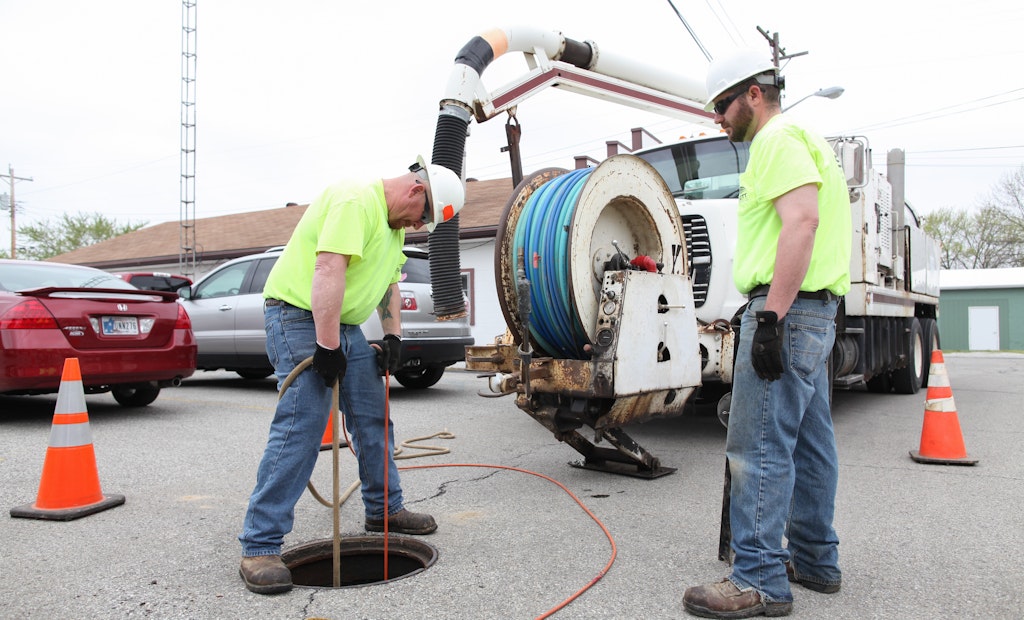
Interested in Cleaning?
Get Cleaning articles, news and videos right in your inbox! Sign up now.
Cleaning + Get AlertsDrain cleaning companies looking for new revenue sources can often find opportunities with municipalities in their area. While the landscape is changing as larger utilities purchase more of their own equipment, the door is still open for those with the right equipment and know-how.
“There are a lot of options that can be offered,” says Dennis Denny, owner of Scott Engineering in Shirley, Indiana. “Cleaning and television, root cutting, and manhole repair; sometimes it will be a one- or two-day job and sometimes up to a month.”
Because Denny has established relationships with the municipalities in his region, Scott Engineering often receives calls “out of the blue” due to a good reputation based on the company’s quality of work and word-of-mouth referrals.
Denny’s advice for companies targeting municipal work is to make contact with the utility’s engineer or engineering firm. If you have the proper equipment and experience, “Let them know what you can offer,” he says.
Another option is to get in with larger companies looking for subcontractors, and make your company available for the services they need.
Express Sewer & Drain in Rancho Cordova, California, does about 50 percent of its business with municipal utilities. Owner Bill Heinselman says those interested in securing some of this work can learn about projects by visiting a city’s website and finding out what contracts are up for bid.
“It’s not easy for a contractor who has not done the work before,” Heinselman says. “Some agencies don’t want to work with small contractors. But bottom line, nothing is secret because they advertise the work. Once you do a lot of work you become an established contractor for municipal projects. But you do have to have a fairly good-sized company.”
Heinselman also points out that there are special programs for small businesses and minority- or woman-owned companies. He says some agencies go out of their way to find candidates who qualify for those funds.
“There is work out there,” he says. “People just need to go out and find it.”
Kevin Jacobson has been on both sides of the table. The former water and wastewater superintendent for Story City, Iowa, Jacobson retired after 23 years in 2014 to start his own drain cleaning and inspection company, Central Iowa Televising.
Jacobson says there are definitely work opportunities out there for routine maintenance with some municipalities because the required equipment is expensive and only the larger cities can afford it. They typically don’t have experienced operators either.
He says the local department of natural resources is a good place to start. The department answers to the EPA and does regular on-site sanitary surveys and inspections. They know where municipalities have to do routine maintenance. They will know where a jurisdiction is having inflow and infiltration problems.
“If you talk with a city about doing work for them, many times they do not have to put out a bid,” Jacobson says. “All states have different rules. In Iowa, if doing routine maintenance, if you keep below a certain dollar volume, you are not required to get competitive bids.”
Jacobson says that in some situations the customer may simply call in two contractors and get two bids, and then make a decision. As long as it is below the threshold, the city doesn’t have to go through the normal bidding process.
He says it is also important to build a relationship.
“A lot of this work is based on trust,” he says. “If you get your foot in the door and do a good job for a community — a fair price and excellent service — the odds are good you will get called back. I’ve done work for a community, and they’ll say, ‘Hey, Kevin, put us on your schedule. Just come and do it when you can.’ Sometimes they will not even talk about price, because they know from past experience what my costs will be.
“You have to have good equipment,” Jacobson adds. “If you break down all the time, that is not good. Keep your equipment washed, the inside of trucks cleaned up. The way your equipment is presented and maintained is an indication of the kind of work you do. If you take care of your equipment, you will take care of the client properly. It is a reflection of your quality of work and what you stand for.”





